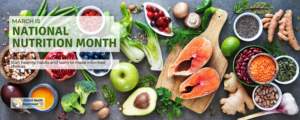
National Nutrition Month (March, 2024)
Key Facts
According to the Centers for Disease Control and Prevention:
- People who often drink sugary drinks are more likely to face health problems, such as weight gain, obesity, type 2 diabetes, heart disease, cavities, and gout, a type of arthritis. You can be a role model for your friends and family by choosing water and other healthy, low-calorie beverages.
- People who have overweight or obesity, compared to those with healthy weight, are at increased risk for many serious diseases and health conditions. A balanced nutrition is key.
- Eating too much sodium can raise your risk of high blood pressure, heart attack, and stroke. More than 70% of the sodium Americans consume comes from packaged and prepared foods. While sodium has many forms, 90% of the sodium we consume is from salt.
March is National Nutrition Month and District Health Department #10 (DHD#10) wants you to thrive on the power of food and nutrition.
Join the Academy of Nutrition and Dietetics to learn about making informed food choices and developing healthful eating and physical activity habits. This year’s theme is “Beyond the Table,” which addresses the farm-to-fork aspect of nutrition, from food production and distribution to navigating grocery stores and farmers markets — and even home food safety and storage practices. It also describes the various ways we eat — not only around a dinner table, but also on the go, in schools and restaurants, at games and events. This theme also includes sustainability, for instance, decreasing food waste from school and work to home and beyond.
Health Tips:
- Eat Breakfast. Start your day with a healthy breakfast that includes lean protein, whole grains, fruits and vegetables.
- Make Half Your Plate Fruits and Vegetables. Fruits and veggies add color, flavor and texture plus vitamins, minerals and dietary fiber to your plate.
- Watch Portion Sizes. Use half your plate for fruits and vegetables and the other half for grains and lean protein foods. Complete the meal with a serving of fat-free or low-fat milk or yogurt. Counting calories all the time is not necessary, but it may help to see how many calories you need. MyPlate Plan calculates the number of calories needed per day to maintain your current weight based on your age, sex, height, weight, and physical activity level.
- Be Active. Regular physical activity has many health benefits. Start by doing what exercise you can. Children and teens should get 60 or more minutes of physical activity per day, and adults at least two hours and 30 minutes per week.
- Get to Know Food Labels. Reading the Nutrition Facts panel can help you choose foods and drinks to meet your nutrient needs.
- Fix Healthy Snacks. Healthy snacks can sustain your energy levels between meals, especially when they include a combination of foods.
- Consult an RDN. Whether you want to lose weight, lower your health-risks or manage a chronic disease, consult the experts! Registered dietitian nutritionists can help you by providing sound, easy-to-follow personalized nutrition advice.
- Follow Food Safety Guidelines. Reduce your chances of getting sick with proper food safety. This includes: regular hand washing, separating raw foods from ready-to-eat foods, cooking foods to the appropriate internal temperature, and refrigerating food promptly. Learn more about home food safety at eatright.org.
- Drink More Water. Quench your thirst with water instead of drinks with added sugars.
- Make an Effort to Reduce Food Waste. Check out what foods you have on hand before stocking up at the grocery store. Plan meals based on leftovers and only buy perishable foods you will use or freeze within a couple of days.
How can DHD#10 help you and your family?
WIC is a nutritional food program that helps participants eat well and stay healthy. While it is named for women, infants, and children, others such as adoptive parents, fathers, grandparents, other family members, foster parents and some non-traditional custodial situations may also be eligible to receive WIC benefits for infants in their care.
Those who qualify receive a WIC Bridge Card used for purchasing healthy foods such as milk, 100% juice, eggs, cheese, cereal, peanut butter, fresh fruits and vegetables, whole grain breads or tortillas, dry or canned beans or peas, baby foods, infant formulas, and soy milk. breastfeeding moms can also purchase canned tuna or salmon. In addition to providing food, WIC offers tips and advice to help feed your family in a healthy way.
Find out if you are eligible for WIC here. Already a WIC client? Click here.
Quick Links
Eatright.org | Academy of Nutrition and Dietetics
